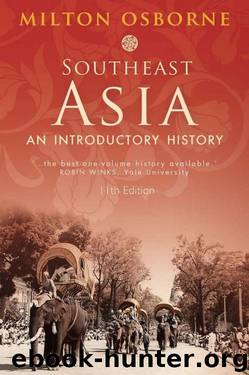Southeast Asia: An introductory history by Milton Osborne

Author:Milton Osborne [Osborne, Milton]
Language: eng
Format: epub
Tags: book, HIS048000
ISBN: 9781743434031
Publisher: Allen & Unwin
Published: 2013-04-01T07:00:00+00:00
Australian POWs in Changi
Those allied soldiers taken prisoner by the Japanese during the war in Southeast Asia suffered terrible deprivation and often appalling brutality. The prisoners of war shown in this photograph were Australian survivors in Changi, the camp in Singapore in which malnutrition reduced healthy men to living skeletons. The fact that the once-proud colonial overlords could be humbled by the Japanese during their conquest of Southeast Asia was a major factor in making the Second World War period a turning point in modern Southeast Asian history. Photograph courtesy of the Australian War Memorial negative no. 19199
In Thailand, which had aligned itself rather half-heartedly on the Japanese side while the war had run in Japan’s favour, the implications of impending Japanese defeat were particularly disturbing. Thai policy at the beginning of the war had taken account of overwhelming Japanese military power and the chance that enlisting on the Japanese side gave of regaining control of areas of Cambodia and Laos, and later of Burma, to which Thai irredentists had long laid claim. This policy had prevented Thailand from suffering the physical destruction of war that was sustained by so many other areas of Southeast Asia. As circumstances changed so did the Thai leadership begin its shift to a position that signalled a clear defection from the Japanese camp, without its being of a kind that could provoke a major Japanese reaction. Nevertheless, all of Thailand’s traditional capacity for astute diplomacy was required when the war did end and the Allied powers contemplated their policies towards a state that had sided against them. Diplomatic skill and more demanding problems elsewhere in Southeast Asia saved Thailand from any serious humiliation and the country found itself at the end of the war much less affected than any other part of the region. For Thailand the Second World War was important but not the cause for overwhelming change either in its relations with the rest of the world or in terms of the nature of its domestic politics. Such an estimation could scarcely be made about any other country in Southeast Asia.
In both Burma and the Philippines, the closing months of the Second World War became a time for preparation for the relatively swift transfer from colonial status to independence. In Burma, as British and Indian military forces carried on a successful campaign that led to the defeat of the Japanese army in 1945, the Allied Supreme Commander in the area, Lord Louis Mountbatten, had agreed to cooperate with the leading Burmese nationalists, men dedicated to complete independence for their country. This wartime decision strengthened the subsequent Burman conviction that the post-war political discussions held with the British were concerned with technicalities for achieving full independence and not about the issue of whether independence should be granted. The path to agreement was not always easy and the policies of the first post-war British government initially seemed a reversal of the approach followed by Mountbatten. In the end, however, and with a minimum of bloodshed, Burma’s passage towards independence was assured.
Download
This site does not store any files on its server. We only index and link to content provided by other sites. Please contact the content providers to delete copyright contents if any and email us, we'll remove relevant links or contents immediately.
China Rich Girlfriend by Kwan Kevin(3905)
The Silk Roads by Peter Frankopan(3788)
Annapurna by Maurice Herzog(2849)
Hot Thai Kitchen by Pailin Chongchitnant(2819)
Full Circle by Michael Palin(2782)
Okonomiyaki: Japanese Comfort Food by Saito Yoshio(2391)
City of Djinns: a year in Delhi by William Dalrymple(2139)
The Ogre by Doug Scott(2121)
Photographic Guide to the Birds of Indonesia by Strange Morten;(2093)
Tokyo by Rob Goss(2023)
Vietnam, Cambodia, Laos & Northern Thailand by Lonely Planet(2019)
Tokyo Geek's Guide: Manga, Anime, Gaming, Cosplay, Toys, Idols & More - The Ultimate Guide to Japan's Otaku Culture by Simone Gianni(1953)
Discover China Travel Guide by Lonely Planet(1869)
Everest the Cruel Way by Joe Tasker(1831)
China (Lonely Planet, 11th Edition)(1802)
Lonely Planet China(1759)
China Travel Guide by Lonely Planet(1744)
Top 10 Dubai and Abu Dhabi by DK Travel(1720)
Iranian Rappers And Persian Porn by Maslin Jamie(1714)
